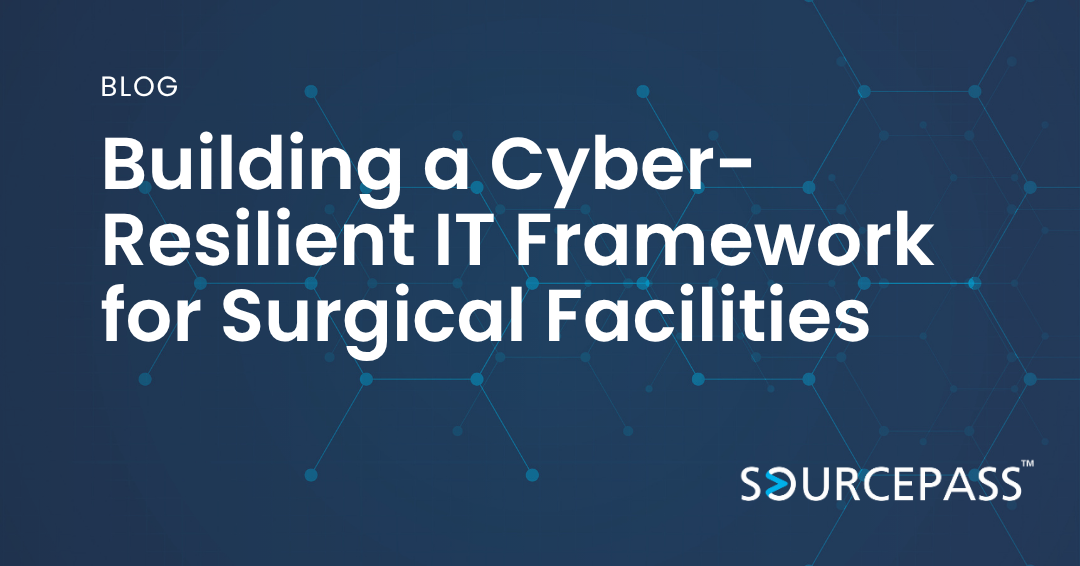Building a Cyber-Resilient IT Framework for Surgical Facilities
Jul 23, 2025 Alex Davis Industry - Healthcare 2 min read



Surgical facilities must go beyond compliance—they must build cyber-resilience. From Ambulatory Surgery Centers (ASCs) to specialized outpatient clinics, these organizations are prime targets for cyberattacks due to the sensitive patient data they store and their increasing reliance on cloud-based and connected medical technologies.
Surgery center cybersecurity is no longer optional. A single breach or ransomware attack can disrupt care, violate HIPAA, erode trust, and cost millions in recovery and penalties. In this article, we outline how outpatient surgical centers can build a cyber-resilient IT framework to protect patient data, maintain compliance, and ensure business continuity.
Why Surgical Facilities Are Prime Cyber Targets
Healthcare records are among the most valuable data on the black market. According to IBM’s 2023 Cost of a Data Breach report, healthcare has the highest average cost per breach—$10.93 million.
Surgical centers often face these vulnerabilities:
- Limited IT resources or part-time support
- Outdated network or legacy software systems
- Poor mobile device security and BYOD policies
- Weak vendor and third-party access controls
- Infrequent security updates or patching
Add to that the growing use of telehealth platforms, digital imaging, patient portals, and internet-connected medical equipment, and the attack surface increases exponentially.
Core Pillars of a Cyber-Resilient Surgical Facility
Creating a cyber-resilient IT framework means going beyond firewalls and antivirus software. It’s about preparing, detecting, responding to, and recovering from any cyber event with minimal disruption to patient care.
1. Data Protection at Every Level
- Encrypt all patient data—both at rest and in transit.
- Implement multi-factor authentication (MFA) for system access.
- Use role-based access controls to limit data exposure.
2. Routine Risk Assessments and Compliance Reviews
- Perform regular HIPAA Security Risk Assessments.
- Identify gaps in healthcare data protection protocols.
- Ensure vendors and contractors comply with the same security standards.
3. Endpoint and Mobile Device Security
- Secure all workstations, tablets, and mobile devices with endpoint protection software.
- Enforce policies for personal device use (BYOD).
- Deploy Mobile Device Management (MDM) solutions to track and manage devices remotely.
4. Network and Infrastructure Hardening
- Segment networks to isolate sensitive systems like EHRs and surgical devices.
- Install intrusion detection/prevention systems (IDS/IPS).
- Keep all systems and software patched and up to date.
5. Backup and Disaster Recovery (BDR)
- Regularly back up critical systems and data to a secure, off-site location.
- Test recovery protocols to ensure rapid restoration of operations.
- Consider BDR-as-a-Service (BDRaaS) solutions tailored for outpatient surgical environments.
6. Security Awareness and Staff Training
- Train all staff on phishing, password hygiene, and safe tech usage.
- Simulate phishing campaigns to evaluate readiness.
- Build a culture of security awareness at all levels of the organization.
7. Incident Response Planning
- Have a documented and tested incident response plan.
- Assign roles and responsibilities for breach scenarios.
- Coordinate with legal, compliance, and IT stakeholders to ensure swift and compliant action.
Cybersecurity Best Practices for Surgical Centers
- Start with a gap analysis: Know where your biggest risks lie.
- Partner with a healthcare-focused MSP: They’ll bring the tools, processes, and expertise your team may lack internally.
- Invest in modern tools: Legacy systems create unnecessary risk. Transition to cloud-based, HIPAA-compliant platforms.
- Audit third-party access: Ensure all vendors—billing, imaging, IT—follow strict security protocols.
The Role of Managed Security in Healthcare IT
Outsourcing some or all of your IT security needs can dramatically increase your cybersecurity posture. A Managed Security Services Provider (MSSP) can offer:
- 24/7 security monitoring
- Threat detection and response
- Compliance reporting and audit support
- Advanced threat intelligence and patch management
For surgical centers with limited IT staff, this approach provides peace of mind and helps meet increasing HIPAA and HITECH regulatory demands.
Conclusion: From Reactive to Resilient
Cyberattacks are no longer a matter of “if,” but “when.” The ability to continue delivering high-quality care while withstanding or recovering from a cyber incident is what separates secure surgical facilities from vulnerable ones.
Surgery center cybersecurity must evolve from a reactive checklist to a proactive strategy. By investing in a cyber-resilient IT framework—one that integrates infrastructure, compliance, and human factors—outpatient facilities can safeguard patient trust, protect sensitive data, and ensure operational continuity in a digital world.
Subscribe To
Sourcepass Insights
Sourcepass Insights
Stay in the loop and never miss out on the latest updates by subscribing to our newsletter today!


